Roanoke Rapids, N.C. – ECU Health North Hospital is bringing comprehensive care close to home with its newest service providing advanced diagnostics through a mobile PET/CT service that began Feb. 2, 2023. PET/CT scans help diagnose different conditions such as cancer, heart disease and brain disorders while improving patient comfort.
“ECU Health North is proud to invest in our patients and care teams by bringing advanced mobile PET/CT services closer to home for our patients,” said Jason Harrell, president, ECU Health North Hospital. “We serve a vast rural area where access to high-quality, specialized care may be many miles away. Innovative technology like the combined PET/CT scan will allow our team to more conveniently create personalized treatment plans for each patient.”
Providers are able to perform the combined scans simultaneously in the same machine, eliminating the need for separate visits while reducing the time needed for scans.

Without this advanced technology, providers traditionally must overlay images of a patient’s individual CT scan and PET scan, which is less efficient than the combined scans offered by this new technology. Combined PET/CT scans take both scans of the patient in the same position for a higher level of accuracy to detect the presence and spread of illness or disease.
“The combined PET/CT scan allows us to more quickly diagnose health issues such as tumors or heart conditions so that we may begin treatment as soon as possible,” said Dr. Sandeep Pandit, Hematology/Oncology, ECU Health North Hospital. “We know early intervention gives patients a higher chance of survival and recovery, and having the PET/CT service available locally will help us improve quality of life of our patients while they undergo diagnosis, treatment and recovery.”
The mobile PET/CT service is the first PET scan and CT scan service for the Roanoke Rapids area. The mobile service is in partnership with Alliance Imaging and will be on ECU Health North Hospital’s campus every other Thursday from 8-11 a.m. Patients who receive a referral from their provider can schedule an appointment by calling 252-535-8888.
Support, action and investment are needed in the East to solve what community members and experts alike are calling a mental health crisis across the region and state. That was the common theme at the Mental Health Town Hall in Greenville hosted by North Carolina Department of Health and Human Services (NCDHHS) Secretary Kody H. Kinsley and local legislators Feb. 9.
The bipartisan panel for the town hall featured Rep. Gloristine Brown, Sen. Jim Burgin, House Majority Leader John Bell, Rep. Dr. Tim Reeder and Sen. Kandie Smith, all of whom represent districts that fall within ECU Health’s 29-county service area. With more than 150 people in attendance, community members and representatives for local organizations shared their perspectives on mental health with the panel.
Kinsley said town halls are crucial to help him and other state officials understand the unique challenges in each area of the state.
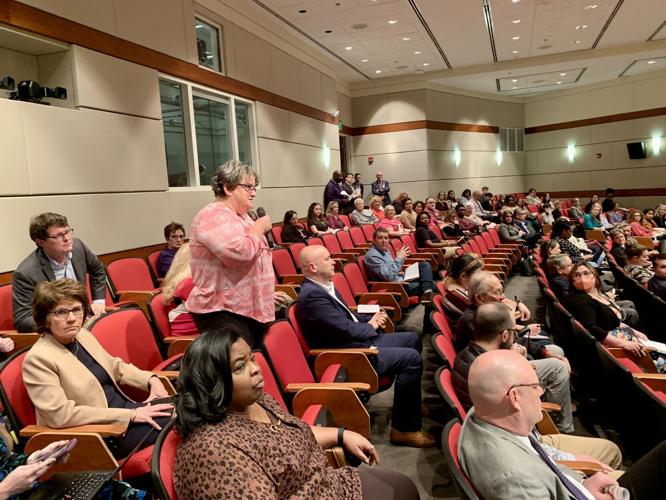
“We are having mental health challenges all across the state, but every community is different because every community’s resources are different and their needs are different,” Kinsley said. “It’s really important to me as we set statewide policy that we’re doing it in a way that is informed by boots on the ground, and we heard a lot of that tonight, and we know we have a lot of work to do, and I’ve appreciated this conversation.”
Dr. Michael Lang, chair of the Department of Psychiatry & Behavioral Health at ECU Health and the Brody School of Medicine said the town hall was a positive step to help share with leaders what he and others are seeing locally. He said it was symbolic to bring the event to Greenville where he and his team see a disproportionate number of patients daily needing mental health resources at the ECU Health Medical Center Emergency Department.
“This was a great event for us overall,” Dr. Lang said. “We had a chance to meet our leadership from Raleigh and let them know about the issues and challenges we’re facing, not only here in eastern North Carolina but across the state. I can tell you firsthand we feel the impact of the mental health crisis here in the region and here in Greenville at the medical center. The challenges we’re talking about, such as a lack of access to resources and a dependence on emergency department visits for those suffering from mental health crises, are felt every day at hospitals across the region. That’s why it is important to focus on improving outpatient behavioral health resources to crate stable environments and prevent hospitalization.”
Officials noted there are at least 350 mental health patients in emergency departments across the state waiting for bed placement on any given day. The lack of access to care and resources are more magnified in rural areas such as eastern North Carolina where there is a disproportionate number of under or uninsured individuals. The bipartisan panel all agreed Medicaid expansion in North Carolina would help provide necessary resources towards solving the crisis and Sen. Burgin noted that Medicaid expansion would allow the state to spend more than $1 billion on improving access to behavioral health resources.
 “ECU Health is grateful for our local legislators who are committed to having these difficult but necessary conversations while at the same time pursuing common-sense solutions like Medicaid expansion,” said Brian Floyd, chief operating officer, ECU Health. “Medicaid expansion would help provide needed health coverage to 100,000 people in our region and improve the way we as a state deliver behavioral health resources.”
“ECU Health is grateful for our local legislators who are committed to having these difficult but necessary conversations while at the same time pursuing common-sense solutions like Medicaid expansion,” said Brian Floyd, chief operating officer, ECU Health. “Medicaid expansion would help provide needed health coverage to 100,000 people in our region and improve the way we as a state deliver behavioral health resources.”
At ECU Health, the system announced a partnership with Acadia Healthcare to build a state-of-the-art, 144-bed behavioral health hospital in the medical district of Greenville, less than a mile from ECU Health Medical Center.
The hospital, slated to open in 2025, will provide important access to behavioral health services for adults and pediatric patients, with 24 inpatient beds specifically for children and adolescents with mental health needs.
“I’m incredibly grateful for health systems that have been investing in building more behavioral health beds,” Kinsley said. “This is important but I have a job to do on this, too. We have got to increase [reimbursement] rates to help make those beds sustainable and used.”
Resources
East Carolina University’s postgraduate program in cardiac psychology creates professionals who are ready to help patients cope as they adapt to life-saving heart devices.
On the heels of marking its 15th year, ECU’s nationally unique program in clinical health psychology continues to gain momentum through positive patient outcomes — and national recognition.
The program is a collaboration between ECU’s departments of psychology and cardiovascular sciences that has yielded a nationally unique blend of academics and research. The model integrates training psychology doctoral students and cardiology fellows in cardiac clinics, a strategy that the program’s founder calls the best of both worlds.
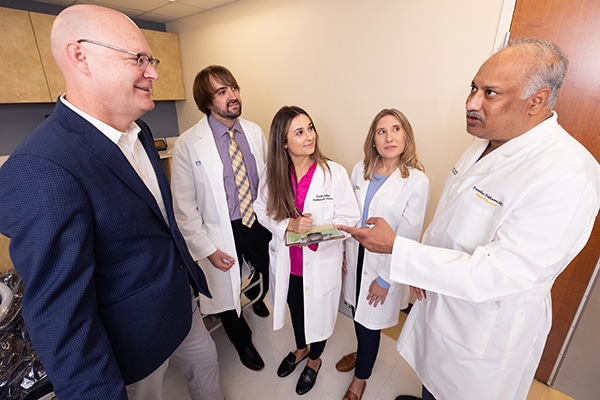
“This is a success story from eastern North Carolina,” said Samuel Sears, program director and professor in the departments of psychology and cardiovascular sciences. “From a national landscape, this is an extremely unique program. Only at East Carolina do you have this kind of synergized, integrated, one-for-one engagement in the training of cardiologists and the training of psychologists. Our program is intending to lead the country in this.”
Sears established the training program in 2007 and collaborates with Rajasekhar Nekkanti, associate professor and director of the cardiology fellowship program at ECU and ECU Health, to offer ECU students an integrated program experience that spans clinical care, research and training.
“Dr. Sears and his colleagues have been able to accomplish what others have only talked about,” said Alan Christensen, professor and chair of the ECU Department of Psychology. “Their seamless integration of clinical psychology into a cardiovascular medicine setting is really a pioneering effort in implementing what I believe will prove to be a more effective approach to training, research, and caring for patients.”
The growing field of cardiac psychology focuses on providing psychological care that is an interdisciplinary, comprehensive care approach to cardiac arrhythmia patients and their families.
Depression and anxiety are common occurrences after cardiac events and can occur in as many as one-third of all patients. These conditions interfere with all aspects of recovery from daily rehabilitative planning, medication adherence, and the pursuit of quality of life.
“Cardiac psychologists help by validating the emotional experience of having a heart problem, and helping patients take the next steps in their recovery emotionally and behaviorally,” Sears said. “ECU Cardiology and Cardiovascular Surgery continue to innovate, and that allows our patients to survive. Here at East Carolina, we have the vision and program to address the patient experience and recovery process fully from a psychological and behavioral perspective. We integrate all the aspects of recovery and prepare trainees for the future of cardiac care.”
The program was highlighted in a 2022 edition of Health Psychology, a journal of the American Psychological Association. The article, “Cardiac Psychology Training in a Rural Health Care Setting: East Carolina Heart Institute,” was led by author Kayla Sall, a 2023 graduate of ECU’s clinical health psychology program. Doctoral students Ashley Griffith, Emily Midgette, Andrea Winters and Connor Tripp also co-authored the article with Sears and Nekkanti.
“We are very proud to publish in our field’s top journal,” said Sall, who begins a psychology internship at Brown University this fall. “The publication goes to show how unique our training experience is. It’s very rare to find cardiac psychologists that are located in cardiology.”
The Health Psychology article covers not only the program’s unique nature of intertwining science with practice, but also its ability to adapt to the COVID-19 pandemic by transitioning to using telehealth to serve patients in rural North Carolina. It also explores the health disparities in eastern North Carolina that impact cardiac patient care and progress.
“Cardiovascular health is one of the leading causes of death in the U.S.,” Sall said, “so being able to take that lens and apply it to the social determinants of health has been amazing, and it’s how we’ve been able to do what we do.”
Greenville native and ECU graduate Scarlett Anthony didn’t have to go far to find a program that offers world-class education and preparation that will help her make a difference in her home region and beyond.
“I chose ECU’s program because of the focus on health psychology and the intersection between psychology and medicine. We train alongside psychologists who are embedded in medicine, and our program provides us with exceptional training among various health care settings,” said Anthony, a doctoral student in clinical health psychology. “I chose ECU’s program because of the dedication to serving diverse populations of eastern North Carolina, and I am passionate about providing care to those who may not have access to health psychology services otherwise.”
Standards of practice

Sall led the writing team in detailing the ECU training program and its strong collaborations in cardiology. The article presents ECU’s program as a national model for ideal collaboration between cardiology and psychology training that enhances the clinical and research expertise of both groups.
The ECU cardiac psychology program is part of the APA accredited clinical health psychology program. This program has achieved national rankings over its 15-year existence and annually has an approximately 5% acceptance. Rob Carels serves as the director of clinical training for the clinical health program.
“The article confirmed that the ECU program is not only one of a kind, but it remains the model as programs and universities try to create this similar-type experience,” Sears said. “The reason it’s so hard to create the ECU experience is that it requires both physicians and psychologists accommodating very different mindsets and contributions with the shared goal of patient success first. Physicians can quickly implant a cardiac device. Psychologists can quickly assess and treat psychological concerns. But when these two sets of problems merge, we need shared expertise.”
The article also highlights the setting of ECU’s health psychology program, a rural area where the social determinants of health — including environment, economic stability, community context, education and health access — impact health and wellness on a greater scale.
“Being in eastern North Carolina, we have a very unique setting with our patient population in a rural area,” Sall said.
That context allows psychologists to better understand the behavioral and mental health of cardiac patients. Many patients seen by cardiac psychologists at the East Carolina Heart Institute include those who suffer depression after a heart attack or other cardiac event, those with atrial fibrillation (a-fib) and those who have recently been fitted with implantable cardioverter defibrillators (ICD) — devices similar to pacemakers that correct heart arrhythmias with a high energy shock that can feel like being kicked by a horse.
“I think that is what is so scary for patients; they agree to have this device implanted, they know it’s life-saving, but you don’t know when the shock is going to go off,” Sall said. “You may go the whole rest of your life without receiving a shock, so that’s where part of the anxiety and fearfulness comes in.”
In the program’s scientist-practitioner approach, providers on each side have a thorough understanding of the opposite discipline.
“I think that’s what’s cool about cardiac psychology — here we are with people presenting with medical conditions or health issues and we’re evaluating, diagnosing, treating emotional behavioral disorders within the context of health and medicine,” Sall said. “We’re not doing just one or the other, we’re doing these together.”
World expert in action
Sears is a highly productive researcher examining quality of life and psychological adjustment in patients with heart rhythm disorders and ICDs. He has published more than 200 articles in the medicine and psychology research literatures and has well over 11,000 citations. In 2021, Expertscape.com named Sears one of the top 50 experts and most prolific authors in the world on ICDs over the last 10 years, amongst the 27,847 authors on the topic.
“I’m involved in both the training of psychologists as well as the training of cardiologists, so we’re trying to make cardiologists better at patient psychology and psychologists better at understanding the cardiology, so it’s synergistic,” Sears said.
Sears travels the world presenting his research and lending his expertise to patient, family and physician groups.
In 2013, the UNC Board of Governors presented Sears with the O. Max Gardner Award, the highest honor bestowed to a faculty member in the UNC system for contributions to mankind.
“The O. Max Gardner Award changed me because I stopped looking for external validation about our achievements. I desperately wanted to make an impact on our patients, our students, our university, our state and beyond,” he said. “The award confirmed some of these marks, so I used my energies more efficiently on the work at hand. I am proud of the health psychology program and the cardiac psychology program that my colleagues and students have created. In terms of work, I am so pleased that many of our ideas about helping cardiac patients are broadly employed across many sectors in cardiology, not just where we started.”
The article in Health Psychology signals consistent success and upward momentum for the program, said Sears, adding that Yale University’s health psychology program is the only other such program mentioned in that edition of the journal.
“This is a 15-year-old program. We’ve established success,” he said. “This is not a great idea that’s going away. Great ideas happen all the time, but they’re not sustainable. This is a sustainable solution that has true outcomes.”
When it comes to patient outcomes, Sears is optimistic that the growing field of cardiac psychology will continue to yield hope and healing.
“We can’t fix all the health inequalities, but what we can do is help our patients make small steps to have better awareness of where there are a lot of possibilities and decision points, and connect them to other resources,” Sears said. “Yes, this is a hard mountain to climb. Let’s do this together.”
Doctoral student Zachary Force said students begin the program learning what clinical health psychology can offer the world — and how ECU is leading the way.
“ECU has always done things differently, and other institutions are starting to take notice. ECU’s cardiac psychology service has received national recognition as the only place in the country to receive specialized training in an area with increasing need,” he said. “ECU’s fighting spirit imbues its doctoral students with the resiliency needed to advocate for psychology within the medical field.”
Read more from ECU News Services
Halifax, N.C. – ECU Health proudly joined community officials and business and health leaders at a Medicaid expansion roundtable hosted by U.S. Congressman Don Davis at the Halifax County Health Department Friday, Jan. 20, 2023, followed by a tour of ECU Health North Hospital.
Jay Briley, president of ECU Health community hospitals, and Jason Harrell, president of ECU Health North Hospital, attended the roundtable to offer insights on health issues impacting Halifax County and eastern North Carolina. Officials urged the need for Medicaid expansion, and community leaders offered perspective and insight on how to best advocate for expansion in North Carolina, which would provide invaluable health and economic benefits to communities across the region. With Medicaid expansion, more than 600,000 North Carolinians – 100,000 of whom live in eastern North Carolina – would have access to the affordable health care coverage they need.

“ECU Health is grateful for the opportunity to meet with Congressman Davis and other community leaders to discuss Medicaid expansion and other important health care needs for Halifax County and the region we so proudly serve,” said Briley. “Medicaid expansion is a crucial initiative that would provide numerous benefits for the state, and especially here in rural eastern North Carolina, where we see high rates of chronic diseases and high rates of uninsured patients. Simply put, Medicaid expansion would make an important difference in the lives of so many, and we are committed to advocating for this important measure.”
Following the roundtable, Briley and Harrell welcomed Congressman Davis to ECU Health North Hospital for a tour of the hospital, including the oncology unit and women and children’s unit. During the tour, the leaders discussed how Medicaid expansion and the Healthcare Access and Stabilization Program would help provide much-needed relief for rural hospitals across the state, ensuring that rural North Carolinians have access to high-quality health care.
“Rural hospitals like ECU Health North play a critical role in the communities they serve,” said Harrell. “Our hospital is not only a hub for high-quality care, but it is also the largest employer in the county. Medicaid expansion should be a top priority for the state, and we appreciate Congressman Davis’s efforts to advocate for the health and well-being of eastern North Carolina.”
Resources
Leaders from across eastern North Carolina came together for the Vision 2023 event hosted by NC East Alliance at the East Carolina Heart Institute on the Brody School of Medicine campus on Jan. 13 to collaborate on workforce development solutions for the region.
Titled “The Power of Possibility: Envisioning the Future of Rural Regional STEM Education,” the event focused on education and job training for the next generation of regional leaders. This served as the first planning meeting for the STEM East Network which aims to improve education, professional learning, workforce development and economic development in the East.
Dr. Michael Waldrum, chief executive officer at ECU Health and dean of the Brody School of Medicine at East Carolina University, is an NC East Alliance Executive Board member and said he believes the health system’s partnership with NC East Alliance is crucial to advancing the mission of ECU Health and the Brody School of Medicine.
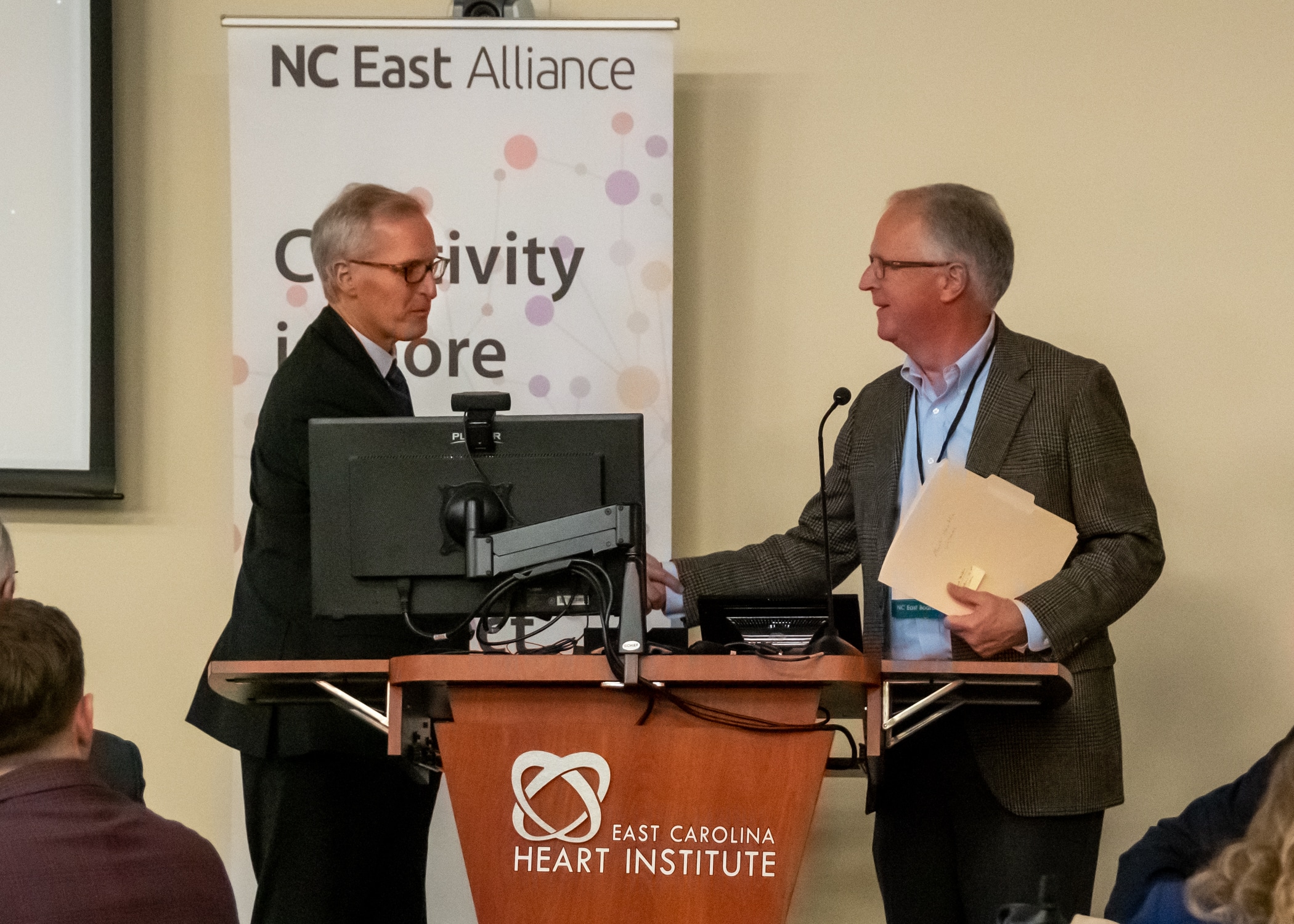
“I’ve been on economic development company boards for over 25 years, and I always say if you really want to improve the health and well-being of a community, you have to drive economic development and if you want to drive economic development, you have to educate people,” Dr. Waldrum said. “It’s really a global perspective – regional transformation and promoting communities involves creating economic opportunities, educating future generations and providing great health care services.”
The event had representation from 29 school systems and 14 community colleges from across eastern North Carolina and the morning session centered on creating an “Industry in School” Alliance that brings together school districts, community colleges and industry in a collaboration designed to bolster the region’s workforce.
Mark Hamblin, chairman of the NC East Alliance, said this new initiative is an important next step for the organization and the region as a whole.
 “A couple years ago we were wondering what was next for this organization and when we came together to develop this initiative, it made so much sense because a regional approach is so important to all of us,” Hamblin said.
“A couple years ago we were wondering what was next for this organization and when we came together to develop this initiative, it made so much sense because a regional approach is so important to all of us,” Hamblin said.
The STEM East Network steering committee will develop regional solutions to help educators become transformative stakeholders in the regional economy. This will include training educators, from elementary school through college, to better understand the industry and workforce needs of the region. As a result, students will have an increased awareness of jobs available in the region.
A key vision for the program is to keep high school graduates in the region for work and further education while the ultimate goal is to encourage eastern North Carolina’s homegrown workforce to stay and serve in communities across the region.
Dr. Waldrum said for rural health care specifically, this initiative is much needed to develop a strong workforce of future regional leaders.
“In health care we need a strong workforce,” Dr. Waldrum said. “Before the pandemic, workforce was a major issue with massive shortages on technicians, nurses and physicians primarily in rural communities. So we focused on how we could recruit and retain our workforce and provide access to care for a vibrant, rural community. Having a group like this come together and help us in that sector with STEM education and economic development is something that I really want to thank everyone here for making happen.”
Forward thinking and grassroots efforts are helping shape a better future for eastern North Carolina and working together is the best way to impact the region far and wide. ECU Health is excited to partner with industry leaders and elected officials, joining forces on regional initiatives like the STEM East Network to promote positive change in the communities we serve.



“It was very nerve wracking coming here,” said Denique Barnett, a pediatric rehab nurse at the James and Connie Maynard Children’s Hospital and international nurse at ECU Health. “I’m an only child, so leaving my family in Jamaica was very hard.”
For Barnett, pursuing her passion has been a journey of more than a 1,000 miles.
“The welcome that I received was a good one,” Barnett said.
The warm reception Denique received is one ECU Health offers nurses from around the world as part of the International Nurses Program.
“My passion is pediatrics, but specifically neonatal nursing,” Barnett said. “Back home there is no degree program for neonatology. So I decided that, you know, to further my studies and to self-actualize, I would need to come to the United States.”
Not only does the program foster additional growth and training for participants, it also fills an important recruiting need for the health system.
“We bring international nurses from all over the globe to come to our organization to spend about two years in a clinical environment,” said Charlene Wilson, chief people officer of ECU Health.
Launched in November 2019, 175 nurses from 21 countries have since spent time at ECU Health.
“Even though these are nurses that are seasoned nurses, they have to go through our NCLEX,” Wilson said. “They then go through the immigration process. They then begin to understand the culture of the various hospitals that have openings for international nurses. One of the things that is very different about their practice here versus their practice in their home countries is the technology.”
“At first, you know, getting used to just how things are done here using technology for me, that was a bit of a challenge,” Barnett said.
“I’m always told by the clinicians, including the doctors, that one of the things that is fascinating about what they bring is their analytical skills, because they don’t have the technology that we have here in the United States,” Wilson said.
It’s a unique perspective put to work for a common goal, improving the health and well-being of the region these nurses now call home.
“As an international nurse, making the leap is the best decision that you will make. There is a lot of opportunities for growth,” Barnett said. “There are a lot of benefits to being here at ECU Health, you know, just make the leap, come, you won’t be disappointed.”
Leaders of Pitt County’s Health Sciences Academy are working hard to give students the real-life skills needed to succeed in the work world—thus fueling the talent pipeline for our state’s employers.
While labor shortages have been prevalent across all industry sectors in recent years, it has been particularly acute in the health care industry and even more so in our state’s more rural communities. However, for Pitt County, this program has brought a tangible solution for training the next generation of health care talent in the Greenville area.
The Health Sciences Academy is a curriculum program, which was created to expose and prepare Pitt County high schoolers who wish to pursue a health care-related career after graduation.

During high school, students participating in the program complete a minimum of six courses that prepare them for various health careers. As part of their program experience, students can participate in job shadowing, mentoring, internships, medical research opportunities, career exploration, and volunteering at ECU Health. In addition to ECU Health, the school system works in tandem with East Carolina University Division of Health Sciences, Brody School of Medicine, the ECU Dental School of Medicine, Pitt Community College, Eastern Area Health Education Center, and the Greenville-Pitt County Chamber of Commerce.
“When people think of health care, they think of doctors and nurses,” said Reed Potts, Health Sciences Academy Coordinator. “Doctors and nurses only make up 30% of the health care workforce, so there are many more jobs out there that the kids do not know about.”
The program, which began in 2000, currently has approximately 1,000 student enrollees, and works with high school students exploring all pathways including two- and four-year colleges, trade school, the military, and others. Potts expressed pride that 30 members of the program’s current cohort will be first-generation college students.
“Seeing a career firsthand — you’ll know whether or not it’s for you,” said Lisa Lassiter, director of workforce development at ECU Health. “We had a student who was set on being a labor and delivery nurse, but after a firsthand experience through Health Sciences Academy, she adamantly decided it was not for her anymore. That’s valuable too, because if she hadn’t had that opportunity, she never would have known until her junior year of college during clinicals.”
Potts said that standalone career nights are extremely beneficial to recruiting future students into the program because they can touch, see, and feel medical equipment and talk to staff about potential careers firsthand. They are also now starting recruitment efforts even earlier among middle schoolers.
To participate in the Health Sciences Academy, students must maintain a 3.0 GPA, have a clean disciplinary record and complete 25 hours of volunteer hours per year. There are also two dedicated counselors that work directly with Health Sciences Academy students and travel to all of Pitt County high schools.
In this program, students learn many soft or durable skills, including leadership, critical thinking, accountability, and communication, and they also get other important training such as etiquette lessons, resume building, and ACT and SAT workshops.
Potts stated that there has been a major return on investment as this program expands the talent pipeline in the Greenville area. “Roughly 50% of the students who go through the Health Sciences Academy stay in the area and go to East Carolina University,” he said. “And we anticipate seeing that number go up even more.”
He also attested that every single student who goes through the program goes to a two- to four-year college, trade school or the military.
When asked what recommendations they would make to other counties looking to implement similar programs, both Potts and Lassiter discussed the importance of constant two-way dialogue between the health system and school system, to ensure the needs of both parties are being met.
“Having direct communication with the school system has been extremely beneficial because we can discuss what’s going great and how to mitigate certain challenges,” said Lassiter. “As a result, we have this very well-trained future pipeline.”
She also stated that many people may be turned off by the cost of a similar program but suggested that other schools and health systems can start small by using time as a resource or having exposure activities that do not cost money.
Read more on NCChamber.com.
Windsor, N.C. – ECU Health is pleased to announce ECU Health Bertie Hospital has been named a 2022 Human Experience (HX) Guardian of Excellence Award® winner for physician engagement by Press Ganey, the global leader in health care experience solutions and services. This award is part of Press Ganey’s annual ranking of the top hospitals and health systems in the country, according to performance in physician engagement.
“It is an honor to receive this award on behalf of the dedicated team members who make ECU Health Bertie a top performing hospital for physician engagement,” said ECU Health Bertie Hospital President Brian Harvill. “It takes a dedicated group of individuals working together to care for a community. I could not be more proud of the ECU Health Bertie doctors, nurses and support staff who work tirelessly to provide excellent patient-centered care to those we are honored to serve.”
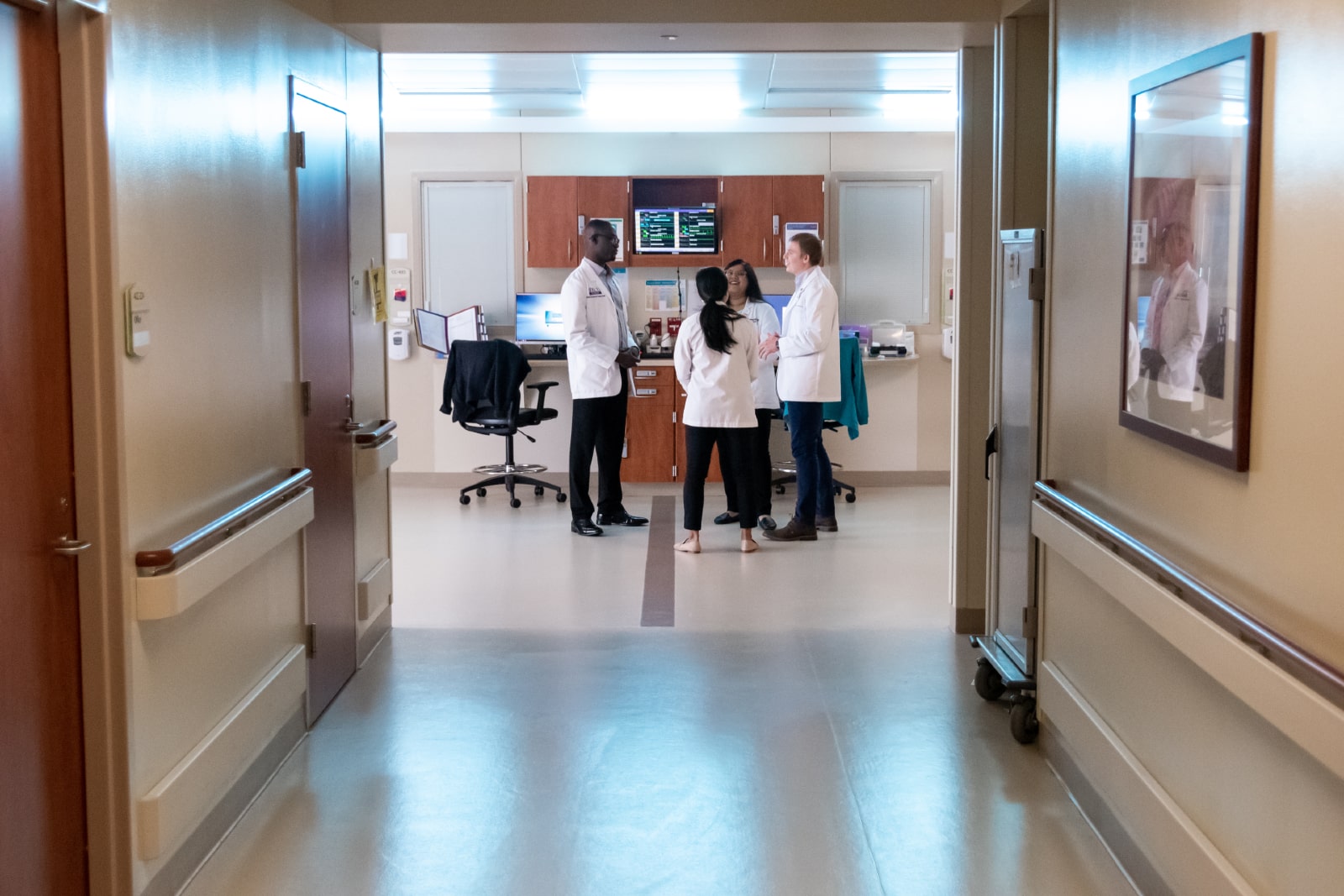
As a winner of the Press Ganey HX Guardian of Excellence Award®, ECU Health Bertie is in the top 5% of health care providers in physician engagement in the last year. Press Ganey works with more than 41,000 health care facilities in its mission to reduce patient suffering and enhance caregiver resilience to improve the overall safety, quality and experience of care.
“By putting their patients and workforce first each and every day, ECU Health Bertie Hospital is demonstrating their unwavering commitment to their employees and to the communities they serve,” said Patrick T. Ryan, chairman and chief executive officer, Press Ganey. “The caregivers at ECU Health Bertie have inspired us with the compassion, empathy and human connection they bring to the clinical healthcare setting. We are honored to partner with them as we celebrate their achievement.”
Team member engagement is central to how ECU Health creates positive experiences and delivers upon its mission to improve the health and well-being of eastern North Carolina. Per fiscal year data, ECU Health Bertie providers rated their engagement better than the national average in all five key engagement performance indicators: engagement, alignment, safety, resilience and diversity.
“As an organization dedicated to providing rural health care, ECU Health understands that exceptional patient experiences are created by compassionate, energized and engaged teams,” said ECU Health Chief Experience Officer Dr. Julie Oehlert. “This award from a globally recognized health care leader like Press Ganey is a testament to our whole team which goes above and beyond to overcome the challenges we face and ensure communities across our region have access to high-quality compassionate care they deserve.”
To learn more about ECU Health Bertie Hospital, visit ECUHealth.org/Bertie
Greenville, N.C. – The National Accreditation Program for Breast Centers (NAPBC), a quality program administered by the American College of Surgeons, has granted accredited status to ECU Health Medical Center for the ninth year. Patients receiving care at a NAPBC-accredited center have access to information on clinical trials and new treatment options, genetic counseling, and patient-centered services including psychosocial support, rehabilitation services and survivorship care.
“ECU Health serves a vast rural region burdened by high prevalence of chronic diseases including cancer,” said Brian Floyd, chief operating officer of ECU Health and president of ECU Health Medical Center. “Our partnership with the Brody School of Medicine at East Carolina University allows us to provide research and clinical trials for patients, as well as recruit high-quality cancer care providers, both of which largely contribute to our accreditation. Bringing standardized, quality care close to home for the 1.4 million people we serve helps us meet our mission of improving the health and well-being of eastern North Carolina.”
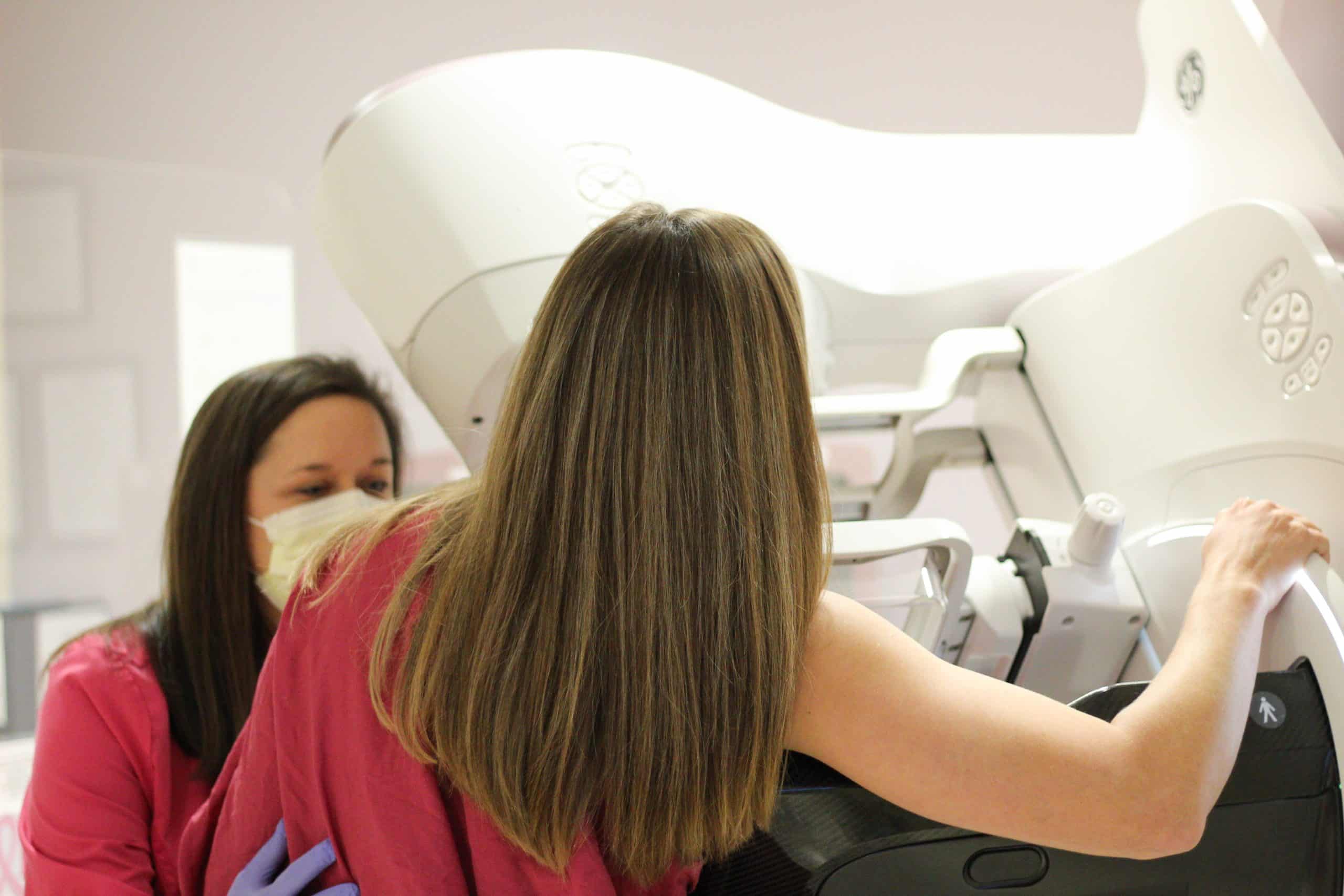
Breast cancer is the second leading cause of cancer deaths for women in North Carolina, according to the North Carolina Department of Health and Human Services. The even higher prevalence of cancers in eastern North Carolina highlights the importance of having an accredited cancer care center in the region. Access to preventative screenings and early detection allows for less invasive treatments, a greater variety of options and a greater potential to prevent the spread of breast cancer.
“ECU Health is committed to maintaining excellence in the delivery of comprehensive, compassionate, patient-centered, high-quality care for patients with all types of cancer,” said Dr. Emmanuel Zervos, executive director of cancer services at ECU Health, and professor at the Brody School of Medicine at ECU. “Patients with breast cancer at ECU Health benefit from a robust team of disease site specialists in surgery, oncology and radiotherapy who are committed to working together to provide the type of care this important designation represents. I am grateful to our ECU Health team members and new breast cancer program leader, Dr. Karinn Chambers, for not only adhering to these standards but surpassing them.”
Accreditation by NAPBC is granted to programs proven to provide the best possible care to patients with breast cancer. To achieve voluntary NAPBC accreditation, a breast center demonstrates compliance with the NAPBC standards that address a center’s leadership, clinical services, research, community outreach, professional education and quality improvement for patients. Breast centers seeking NAPBC accreditation undergo a site visit every three years.
To learn more about breast cancer screenings and treatment options near you, please visit ECUHealth.org/breast-cancer.
Greenville, N.C. – ECU Health, the premier health system serving eastern North Carolina, experienced a transformational year highlighted by the introduction of a new brand, announcement of a new behavioral health hospital, recognition of multiple team members on the state and national levels and realization of clinical achievements and innovations that enhance the care for the 1.4 million people the organization proudly serves.
“As we reflect on the historic year that was and celebrate our achievements, I want to take a moment to extend my heartfelt gratitude to the team members who make ECU Health what it is: a premier rural academic health system dedicated to serving the people who call eastern North Carolina home,” said Dr. Michael Waldrum, ECU Health CEO and Dean of the Brody School of Medicine. “As one year comes to a close and another begins, I know the next chapter of our shared story will be just as important. Our efforts in 2022 helped position us to navigate the complex challenges we face moving forward by bringing clinical, education and research innovations, but we still have work to do in the upcoming year and beyond to ensure our communities have access to the high-quality care they deserve.”
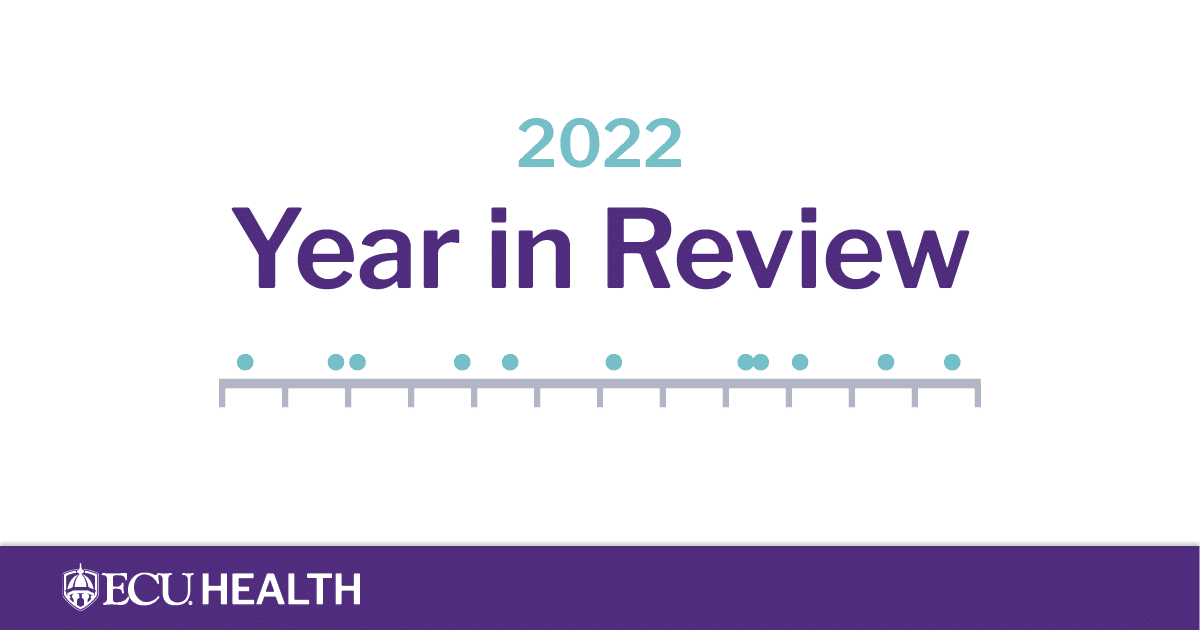
The following highlights are only a few of the many achievements across ECU Health in 2022. For a more comprehensive review of the year, please visit: ECUHealth.org/YearinReview2022
Evolving to ECU Health
The re-brand to ECU Health is a visual reminder of how transformative the year has been. The ECU Health logo is a symbol of the commitment to transforming and elevating health care for millions, training the providers of tomorrow, collaborating with community partners to solve complex issues and bringing clinical innovations that improve the lives of those who call this region home.
The Brody School of Medicine at East Carolina University and the health system began a joint operating agreement on Jan. 1, 2022. In April, the two organizations hosted a press conference and shared the new logo for ECU Health and announced the brand launch that would begin in May.
In the months since, there have been visual changes across the health system from signage around hospitals and clinics to websites and social media channels. More importantly, the creation of ECU Health has opened the door for the system to improve access to care across eastern North Carolina while training health care professionals through Brody.
Expanding access to behavioral health care in eastern North Carolina
Access to behavioral health care is crucial across the country, but especially in rural areas like eastern North Carolina. In June, ECU Health and Acadia Healthcare announced plans to build a state-of-the-art, 144-bed behavioral health hospital in the medical district of Greenville, less than a mile from ECU Health Medical Center.
Slated to open in spring 2025, the hospital will operate through a joint venture between ECU Health and Acadia, the largest standalone provider of behavioral health care services across the United States. Together, the organizations will invest approximately $65 million in expanding behavioral health resources in eastern North Carolina.
The hospital will include 24 inpatient beds specifically for children and adolescents with mental health needs. These beds will be the first of their kind in ECU Health’s 29-county service area and the only child and adolescent beds within 75 miles of Greenville, North Carolina.
Twenty-two ECU Health nurses recognized among Great 100 Nurses of North Carolina
This year, 22 ECU Health nurses were selected to the 2022 NC Great 100. This is the largest number of ECU Health nurses to receive this recognition. The honorees were celebrated at a gala hosted by The North Carolina Great 100, Inc. in Greenville in October.
Since 1989, The North Carolina Great 100, Inc. has recognized and honored nurses around the state for their commitment to excellence and to promote a positive image of the nursing profession. Out of thousands of nominations that are submitted annually, 100 recipients are selected based on their outstanding professional abilities and contributions made to improving health care services to their communities.
ECU Health Beaufort Hospital designated as primary stroke center by The Joint Commission
In July, ECU Health Beaufort Hospital – a campus of ECU Health Medical Center was designated as a primary stroke center by The Joint Commission and the American Heart/Stroke Association, recognizing the hospital’s preparedness and expertise to care for stroke patients. Stroke is one of the leading causes of death in the state, resulting in more serious long-term disabilities than any other disease.
With ECU Health Beaufort’s designation, all ECU Health’s hospitals are stroke certified by The Joint Commission.
